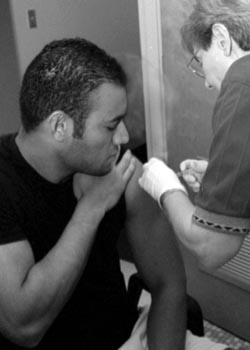Loyola students are concerned because the Student Health Center does not provide birth control and condoms.
According to an Aug. 20 Times-Picayune article, Loyola is bound by the guidelines developed by the Committee on Doctrine of the National Conference of Catholic Bishops, which ban contraception, contraception counseling, abortion, some assisted-reproduction techniques and other services, even if it does not require schools to follow these rules.
According to the article, Vicki McNeil, the administrative director for student health services at Loyola, said the university has treated students for sexually transmitted diseases and that care and concern for the individual is one of the values of a Jesuit education.
“But there are limits. We will meet with a student regarding birth control, but we do not issue contraception,” she said. “Occasionally, if birth control is necessary, we will refer the student to someone outside the school. If a student gets pregnant, we recommend counseling with the university minister or with an appropriate physician for pre-natal care.” McNeil was unavailable for comment for The Maroon.
Michelle Theriot, the Nurse Health Educator at the Student Health Center, says the Health Center does provide some gynecological services, such as breast exams, pelvic exams and treating urinary tract infections.
Pap Smears, part of a full gynecological exam, are not provided because they are considered pre-cancer screening, and they involve long-term follow up, which is something Loyola’s Health Center does not have the resources to handle.
If the student needs attention the Health Center cannot provide, the student will be referred to off-campus options, such as Dr. Hamilton, a gynecologist, or the Daughters of Charity, a clinic that works on a sliding pay scale based on income.
None of these options are under Loyola’s Student Insurance plan, however.
According to the Times Picayune, in order to make these other options more available to the students, “we are currently in the process of making sure she [Dr. Hamilton]” will accept Loyola Student Insurance.
The Health Center also provides anonymous pregnancy tests and STD tests.
For STD tests, students should go to the Student Health Center. There are male and female doctors in case students prefer one over the other, and the doctors’ hours are posted on the Student Health Center’s door.
“I support the university in its decision because I think that as a Catholic Institute, we should uphold the Jesuit Ideals if the church says no to birth control and contraceptives. If Loyola is expected to change its policy, Loyola should wait for the church to change the policy and then Loyola can change its policy,” said Courtney Sloan, a psychology pre-med senior major.
A student who asked to remain anonymous disagreed. “I think that living in a Utopian world where kids don’t have sex is a lot more heinous than making birth control and condoms available,” the student said.
On the medical side of this issue, another anonymous student said, “I think the university should provide birth control and condoms. They have other uses besides preventing pregnancy. Condoms are used to prevent STDs.
“Also, birth control pills are used to regulate periods, relieve cramps and headaches and to treat endometriosis, among many other female problems. For the university to ignore these issues is a big concern of mine.”






